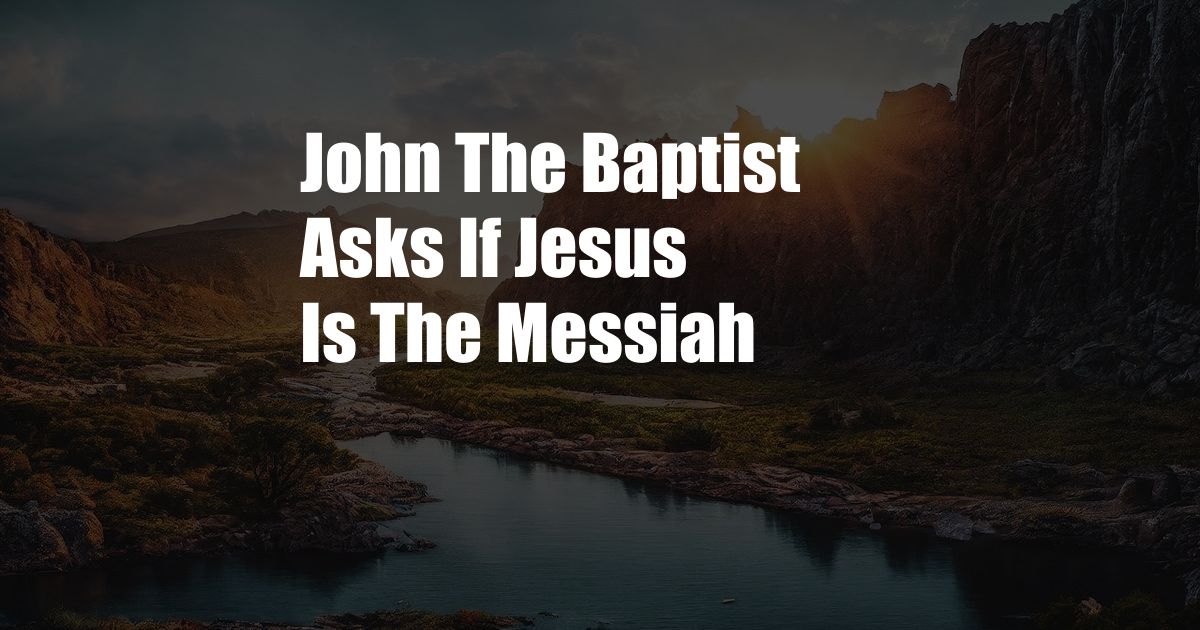
Did John the Baptist Ask Jesus if He Was the Messiah?
On a sweltering morning amidst the rugged landscape of the Judean Desert, there lived a man of unwavering faith and unyielding devotion. His name was John, known to the world as John the Baptist, a prophet whose mission was to prepare the way for the coming of the Messiah.
John’s voice echoed through the wilderness, resonating with an urgency that stirred the hearts of all who heard him. He spoke of repentance and the forgiveness of sins, proclaiming that the kingdom of God was at hand. People from all walks of life flocked to the banks of the Jordan River, where John baptized them as a symbol of their spiritual cleansing.
The Baptism of Jesus
Among those who came to be baptized was a young man named Jesus of Nazareth. As Jesus emerged from the water, the heavens opened, and a dove descended upon him. A voice from heaven proclaimed, “This is my beloved Son, in whom I am well pleased.”
John witnessed this extraordinary event with a mixture of awe and wonder. He had long anticipated the arrival of the Messiah, and he recognized Jesus as the one who would fulfill that role. However, instead of declaring Jesus to be the Messiah outright, John chose to pose a question that has intrigued theologians and historians for centuries.
The Question
As Jesus approached John, he said, “Are you the one who is to come, or shall we look for another?” (Matthew 11:3)
This question, seemingly simple on the surface, carried profound implications and reflected John’s unwavering desire for certainty. John had dedicated his life to preparing the way for the Messiah, but he wanted to be absolutely sure that Jesus was the one he had been waiting for.
Jesus’s Response
Jesus’s response to John’s question was subtle yet profound. He did not explicitly declare himself to be the Messiah, but rather pointed to his actions and teachings as evidence of his divine mission.
“Go and tell John what you hear and see: the blind receive their sight, the lame walk, the lepers are cleansed, the deaf hear, the dead are raised, the poor have good news brought to them. And blessed is anyone who takes no offense at me.” (Matthew 11:4-6)
Jesus’s words echoed the prophecies of Isaiah, who foretold the coming of a servant who would bring healing and liberation to the oppressed and marginalized. By referring to his own miracles and teachings, Jesus demonstrated that he was fulfilling these prophecies and, by extension, laying claim to his Messianic identity.
John’s Confirmation
John accepted Jesus’s response as confirmation that he was indeed the Messiah. He declared to his disciples, “He who comes after me is mightier than I, whose sandal strap I am not worthy to untie.” (Mark 1:7) John’s humility and recognition of Jesus’s authority underscored his unshakeable faith.
The Significance of John’s Question
John the Baptist’s question, “Are you the one who is to come, or shall we look for another?” serves as a reminder of the importance of seeking assurance and confirmation in matters of faith.
While blind faith may be commendable in some instances, it is equally important to critically examine our beliefs and to seek evidence that supports them. John’s question demonstrates that even those who have dedicated their lives to God may experience moments of doubt and uncertainty.
Tips for Seeking Confirmation
In our quest for spiritual truth, it is essential to adopt a balanced approach that combines faith with critical thinking. Here are a few tips for seeking confirmation in matters of faith:
- Study the scriptures: The Bible provides a wealth of information about the nature of God, the life of Jesus, and the teachings of the early church.
- Pray for guidance: Prayer is a powerful tool for connecting with God and seeking his guidance in our lives.
- Seek counsel from trusted mentors: Surround yourself with wise and experienced individuals who can provide spiritual direction and support.
- Observe the fruits of faith: Pay attention to the positive outcomes and transformations that result from your beliefs.
- Be patient: Confirmation often comes gradually over time as we grow in our faith and understanding.
By following these tips, we can strengthen our faith and deepen our connection to God.
FAQs
Q: Why did John the Baptist question Jesus’s identity?
A: John wanted to confirm that Jesus was indeed the Messiah and to reassure his disciples.
Q: How did Jesus respond to John’s question?
A: Jesus pointed to his miracles and teachings as evidence of his divine mission and fulfillment of prophecy.
Q: What can we learn from John the Baptist’s example?
A: We can learn the importance of seeking confirmation in matters of faith and the value of critical thinking and evidence-based reasoning.
Q: How can we apply John’s example to our own lives?
A: We can study the scriptures, pray for guidance, seek counsel from trusted mentors, observe the fruits of faith, and be patient in our pursuit of knowledge and understanding.
Conclusion
John the Baptist’s question, “Are you the one who is to come, or shall we look for another?”, remains a timeless reminder of the human search for spiritual assurance. By embracing the principles of faith, critical thinking, and the pursuit of evidence, we can deepen our understanding of God and our place in his creation.
Are you interested in learning more about the life and teachings of Jesus? Explore our blog for additional resources and insights into the Christian faith.